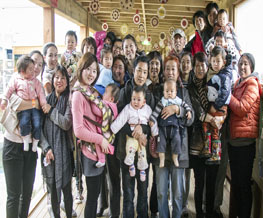Teenage Parenting (Korean2)
 Parenting Styles and Adolescents
Parenting Styles and Adolescents
The teenage years are often portrayed as stressful for both parents and teens. 10대로 지낸다는 것은 부모님이나 그 자녀에게 모두 스트레스를 받는 걸로 생각될 수 있다. Research demonstrates that teens undergo a number of developmental adjustments including biological, cognitive, emotional and social changes on their way to becoming adults. 리서치에 의하면 10대들은 생물학적,인지적, 정서적 그리고 사회적으로 성인이 되어가는 과정을 거치는 단계에 있다고 볼 수 있다. Parenting effectively during the teen years, as in any developmental period, requires a thorough understanding of these normative developmental changes. 십대들을 위한 효과적인 부모교육은 십대들이 발달해 가는 과정과 발달과정에 따른 보편적으로 변해가는 과정을 잘 받아 들여야 하는 것이다
Psychologist Diana Baumrind (1971, 1991) identified four patterns of parenting styles based upon two aspects of parenting behavior: control and warmth. Parental control refers to the degree to which parents manage their children’s behavior—from being very controlling to setting few rules and demands. Parental warmth refers to the degree to which parents are accepting and responsive of their children’s behavior as opposed to being unresponsive and rejecting. When the two aspects of parenting behavior are combined in different ways, four primary parenting styles emerge:
Authoritative Parents are warm but firm. They encourage their adolescent to be independent while maintaining limits and controls on their actions. Authoritative parents do not invoke the “because I said” rule. Instead, they are willing to entertain, listen to, and take into account their teen’s viewpoint. Authoritative parents engage in discussions and debates with their adolescent, although ultimate responsibility resides with the parent. Research demonstrates that adolescents of authoritative parents learn how to negotiate and engage in discussions. They understand that their opinions are valued. As a result, they are more likely to be socially competent, responsible, and autonomous.
Authoritarian Parents display little warmth and are highly controlling. They are strict disciplinarians, use a restrictive, punitive style, and insist that their adolescent follow parental directions. Authoritarian parents invoke phrases such as, “you will do this because I said,” and “because I’m the parent and you are not.” Authoritarian parents do not engage in discussions with their teen and family rules and standards are not debated. Authoritarian parents believe the adolescent should accept, without question, the rules and practices that they establish. Research reveals that adolescents of authoritarian parents learn that following parental rules and adherence to strict discipline is valued over independent behavior. As a result, adolescents may become rebellious or dependent. Those who become rebellious might display aggressive behaviors. Adolescents who are more submissive tend to remain dependent on their parents.
Permissive Parents are very warm, but undemanding. They are indulgent and passive in their parenting, and believe that the way to demonstrate their love is to give in to their adolescent’s wishes. Permissive parents invoke such phrases as, “sure, you can stay up late if you want to,” and “you do not need to do any chores if you don’t feel like it.” Permissive parents do not like to say no or disappoint their children. As a result, teens are allowed to make many important decisions without parental input. Parents do not view themselves as active participants in shaping their teen’s actions; instead they view themselves as a resource, should the adolescent choose to seek their advice. Research findings show that adolescents of permissive parents learn that there are very few boundaries and rules and that consequences are not likely to be very serious. As a result, teens may have difficulty with self-control and demonstrate egocentric tendencies that can interfere with proper development of peer relationships.
Uninvolved Parents are not warm and do not place any demands on their teen. They minimize their interaction time, and, in some cases, are uninvolved to the point of being neglectful. Uninvolved parents are indifferent to their adolescent’s needs, whereabouts, or experiences at school or with peers. Uninvolved parents invoke such phrases as, “I don’t care where you go,” or “why should I care what you do?” Uninvolved parents rarely consider their teen’s input in decisions and they generally do not want to be bothered by their teen. These parents may be overwhelmed by their circumstances or they may be self-centered. Parents might also engage in this style if they are tired, frustrated, or have simply “given up” in trying to maintain parental authority. Research supports that adolescents of uninvolved parents learn that parents tend to be interested in their own lives and less likely to invest much time in parenting. As a result, teens generally show similar patterns of behavior as adolescents raised in permissive homes and they may also demonstrate impulsive behaviors due to issues with self-regulation.
![]()



